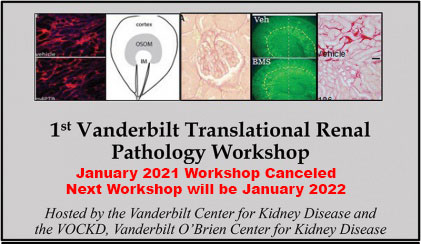 The Vanderbilt O’Brien Center for Kidney Disease (VOCKD) is organizing a 2.5-day, comparative renal pathology workshop-including analysis of diabetic nephropathy, FSGS, AKI and crescentic kidney disease in mice and man, with didactic and hands-on training in qualitative and quantitative renal pathology. Dr. Agnes Fogo and Dr. Haichun Yang from the Division of Renal Pathology at Vanderbilt University Medical Center have developed a virtual slide-based workshop to train pre-clinical investigators on the fundamentals of human and experimental renal pathology, focusing on similarities and differences between human disease and the preclinical mouse models used to study human disease. The focus will be to train investigators to understand the relevance of experimental models of human disease and to understand how to interpret and quantify histological findings using these models so they can bring this expertise back to their own institutions.
The Vanderbilt O’Brien Center for Kidney Disease (VOCKD) is organizing a 2.5-day, comparative renal pathology workshop-including analysis of diabetic nephropathy, FSGS, AKI and crescentic kidney disease in mice and man, with didactic and hands-on training in qualitative and quantitative renal pathology. Dr. Agnes Fogo and Dr. Haichun Yang from the Division of Renal Pathology at Vanderbilt University Medical Center have developed a virtual slide-based workshop to train pre-clinical investigators on the fundamentals of human and experimental renal pathology, focusing on similarities and differences between human disease and the preclinical mouse models used to study human disease. The focus will be to train investigators to understand the relevance of experimental models of human disease and to understand how to interpret and quantify histological findings using these models so they can bring this expertise back to their own institutions.
Reasons You Should Attend
-
You study mouse models of kidney disease but do not know how well these reflect the human condition
-
You do not know how to evaluate mouse renal pathology and would like to learn semi-quantitative analyses of changes
-
You have new personnel who need to be trained to study mouse kidney disease
- Training Course Instructors
-
Agnes Fogo, M.D., Professor and Director, Renal Pathology - Dr. Fogo is an expert on human and experimental renal pathology, with experience studying chronic renal injury models in mice. She is Director of this workshop.
Haichun Yang, M.D., Ph.D., Instructor, Renal Pathology - Dr. Yang is an expert on experimental renal pathology and has extensive experience developing quantitative analyses. He is Co-director of this workshop.
Kelli Boyd, D.V.M., Ph.D., Associate Professor - Dr. Boyd is Director of Comparative Pathology and is a Veterinary Pathologist with extensive experience on pathology of mouse models and genetically engineered mouse phenotyping
Paisit Paueksakon, M.D., Professor, Renal Pathology - Dr. Paueksakon is a renal pathologist with extensive experience studying human disease
Joseph Roland, Ph.D., Research Associate Professor - Dr. Roland is the Director of the Digital Histology Shared Resource, and a specialist in whole slide imaging and quantitative microscopy
Mark de Caestecker, M.B., B.S., Ph.D., Professor - Dr. de Caestecker studies renal regenerative therapies for acute kidney injury
Ambra Pozzi, Ph.D., Professor - Dr. Pozzi is an expert on molecular mechanisms of fibrosis and diabetic kidney diseaseCharles Jennette, M.D, - Professor of Pathology & Laboratory Medicine, Director, UNC Nephropathology Division, School of Medicine. Dr. Jennette is an internationally recognized expert on human and experimental immunologically mediated renal diseases.
- Training Agenda
-
Day 1
Introduction and Diabetes
7-8am: Orientation with breakfast
8-8:45am: Overview of Mouse Pathology (Kelli Boyd)
8:45-9:30am: Overview of Mouse Renal Pathology (Agnes Fogo)
9:30-10:15am: Quantitative histological analysis (Haichun Yang)
10:15-10:30am: Break
10:30-11:15am: Digital histology and Aperio Image Scope software (Joseph Roland)
11:15-12pm 11:15-12pm: Practice the software and recognize different staining (Joseph Roland and Haichun Yang)
12-12:30pm: Lunch provioded
12:30-1:15pm: Diabetic kidney disease-human pathology (Agnes Fogo)
1:15-2pm: Diabetic mouse models (Pozzi)
2-2:45pm: Glomerular injury and quantification in mouse DN models (Haichun Yang)
2:45-3pm: Break
3:00-5:00pm: Practice for semi-quantification-glomerular injury score (PAS), quantification-mesangial expansion (PAS) (Agnes Fogo and Haichun Yang)
Day 2
FSGS and AKI
7:30-8am: Breakfast
8-8:45am: FSGS-human pathology (Fogo)
8:45-9:30am: FSGS models in mice (Fogo)
9:30-10:15am: Glomerulosclerosis and podocyte injury quantification in mouse FSGS model (Haichun Yang)
10:15-10:30am: Break
10:30-12pm: Practice for semi-quantification-glomerulosclerosis (PAS), quantification-glomerular matrix (Col IV) (Agnes Fogo and Haichun Yang)
12-12:30pm: Lunch provided
12:30-1:15pm: AKI-human (Paueksakon)
1:15-2:00pm: AKI and AKI to CKD transition models in mice (Mark de Caestecker)
2:00-2:45pm: Tubular injury and interstitial fibrosis in AKI and AKI-to-CKD mouse models (Yang)
2:45-3pm: Break
3:00-5pm: Practice for semi-quantification-tubular injury score (PAS), interstitial fibrosis
(sirius red and Col I) (Fogo/Yang)6pm till late: Night out on the town!
Day 3
Crescentic Glomerulonephritis
7:30-8am: Breakfast
8-8:45am: Crescentic GN-human pathology (Charles Jennette)
8:45-9:30am: Mouse pathology (Jennette)
9:30-10:15am: Glomerular crescent and necrosis quantification in mice (Yang)
10:50-10:30am: Break
10:30-11:45am: Practice for quantification- glomerular crescents and (PAS), glomerular necrosis (PAS) (Agnes Fogo/Haichun Yang)
11:45-12:15pm: Lunch provided
Feedback and closing remarks
- Workshop Fees
-
$450 and $900 industry
Fee includes:
Course materials*, continental breakfasts, snacks, lunches, & an evening in Nashville. It will take place onsite at Vanderbilt University Medical Center.
To apply:
Submit your CV (including department, address, phone and email, information on career stage, goals, experience and objectives for the course.
Send details to:
Linda Forrest, Program Manager, Vanderbilt University Medical Center, Division of Nephrology,1161 21st Ave. S., MCN S-3223, Nashville, TN 37232. Phone: 615-322-2150
Linda.forrest@vumc.orgParticipants are responsible for travel and accommodation expenses. You are welcome to stay anywhere you like, but we have an agreement with Homewood Suites at Vanderbilt. If you are interested contact Linda.
*Each attendee must bring a computer. We will provide human and mouse virtual slides and software (image J, Aperio Image Scope). Background on individual human diseases or models and working sheet will be provided.
